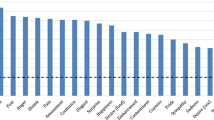Abstract
This work aims at measuring the anticipated perception of emotions on minimal linguistic units, to evaluate if the underlying cognitive processing is compatible with the hypothesis of gradient contours. Selected monosyllabic stimuli extracted from an expressive corpus and expressing anxiety, disappointment, disgust, disquiet, joy, resignation, sadness and satisfaction, were gradually presented to naïve judges in a gating experiment. Results strengthen the hypothesis of gradient processing by showing that identification along successive gates of most of expressions follow a linear pattern typical of a contour-like processing, while expressions of satisfaction present distinct gradient values that make possible an early identification of affective values.
Similar content being viewed by others
References
Aubergé, V., Audibert, N., Rilliard, A.: E-Wiz: A Trapper Protocol for Hunting the Expressive Speech Corpora in Lab. In: Proceedings of the.4th International Conference on Language Resources and Evaluation (LREC), Lisbon, Portugal, pp. 179–182. Portugal (2004)
Aubergé, V., Audibert, N., Rilliard, A.: Acoustic morphology of expressive speech: What about contours? In: Proceedings of the 1st International Conference on Speech Prosody, Prosody, Nara, Japan, pp. 91–95 (2004)
Aubergé, V.: A gestalt morphology of prosody directed by functions: the example of a step by step model developed at ICP. In: Proceedings of the 1st International Conference on Speech Prosody, Aix-en-Provence, France, pp. 151–155 (2002)
Audibert, N., Aubergé, V., Rilliard, A.: The prosodic dimensions of emotion in speech: the relative weights of parameters. In: Proceeding of the 9th European Conference on Speech Communication and Technology (Interspeech), Lisbon, Portugal, pp. 525–528 (2005)
Bänziger, T., Scherer, K.R.: The role of intonation in emotional expressions. Speech Communication 46, 252–267 (2005)
Grosjean, F.: Spoken word recognition processes and the gating paradigm. Perception & Psychophysics. 28, 267–283 (1980)
Kohler, K.J.: Timing and Communicative Functions of Pitch Contours. Phonetica 62, 88–105 (2005)
Scherer, K.R.: Appraisal considered as a process of multi-level sequential checking. In: Scherer, K., Schorr, A., Johnstone, T. (eds.) Appraisal processes in emotion: Theory, Methods, Research, pp. 92–120. Oxford Univ. Press, Oxford (2001)
Author information
Authors and Affiliations
Editor information
Rights and permissions
Copyright information
© 2007 Springer-Verlag Berlin Heidelberg
About this paper
Cite this paper
Audibert, N., Aubergé, V. (2007). Gradient or Contours Cues? A Gating Experiment for the Timing of the Emotional Information. In: Paiva, A.C.R., Prada, R., Picard, R.W. (eds) Affective Computing and Intelligent Interaction. ACII 2007. Lecture Notes in Computer Science, vol 4738. Springer, Berlin, Heidelberg. https://doi.org/10.1007/978-3-540-74889-2_84
Download citation
DOI: https://doi.org/10.1007/978-3-540-74889-2_84
Publisher Name: Springer, Berlin, Heidelberg
Print ISBN: 978-3-540-74888-5
Online ISBN: 978-3-540-74889-2
eBook Packages: Computer ScienceComputer Science (R0)



